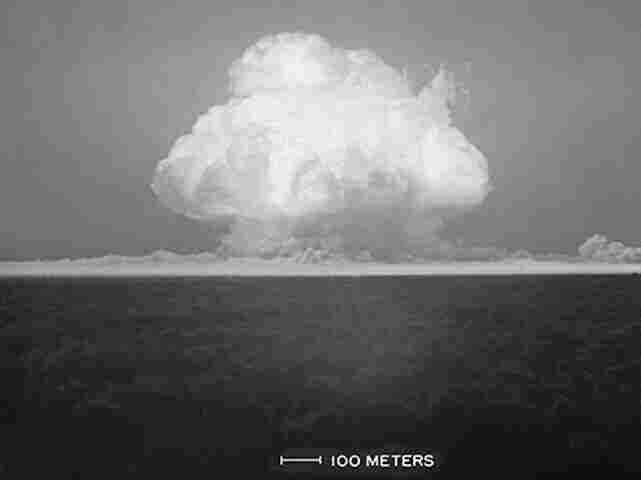Politics
Federal aid for those sickened by U.S. nuclear testing set to expire
Funding for those sickened by U.S. nuclear testing is set to run out on Friday.
White Sands Missile Range Photo
hide caption
toggle caption
White Sands Missile Range Photo
Funding for those sickened by U.S. nuclear testing is set to run out on Friday.
White Sands Missile Range Photo
With negotiations on Capitol Hill at a standstill, a 34-year-old federal benefits plan for survivors of the country’s nuclear testing program is now set to expire on Friday.
Legislation to reauthorize and expand the program known as the Radiation Exposure Compensation Act, or RECA, has been stalled in the Republican-led House for months.
It’s a fact that vexes supporters of RECA, including the bill’s bipartisan Senate sponsors.
“It’s disappointing,” Sen. Ben Ray Luján, D-N.M., said in a statement to NPR. “I’m continuing to have conversations with my colleagues and advocates on the path forward if the House fails to pass my legislation in time. All options should be on the table to find a vehicle to extend and expand RECA.”
Sens. Luján and Josh Hawley, R-Mo., have pushed to expand RECA to cover others sickened by fallout from the atomic bomb testing program. Both have seen the impacts on constituents in their own states, and want the program to recognize uranium mine workers and so-called downwinders caught in the path of toxic exposures.
Although the legislation passed in the Democratic-led Senate numerous times in recent months, House Republicans, led by House Speaker Mike Johnson, have failed to reach an agreement to put a new expanded version of the program before members for a vote.
Last month,two dozen RECA advocates met with officials on Capitol Hill, including Johnson, to urge the bill’s passage. Last week, Johnson looked at potentially putting a more limited RECA extension on the floor, but reversed course after advocates raised alarm.
Since 1990, RECA has provided lump sum payments of up to $75,000 to the so-calledatomic veterans and others sickened by the nuclear testing program. The plan, administered by the Justice Department, has disbursed$2.7 billion in payments to more 40,000 recipients.
Theatomic veterans include military servicemembers who were directed by U.S. military officials to watch the secret tests or face disciplinary actions. RECA was meant to recognize their sacrifices and compensate long-term health effects as a result of toxic exposures.
At least 200,000 U.S. troops participated in the tests and cleanup operations during World War II and later in the Pacific Ocean, the Nevada desert, New Mexico and the Atlantic Ocean.
The test’s deadly ionizing radiation also contaminated nearby lands, water and communities for generations to follow.
Luján, who has worked on boosting RECA since his election to Congress in 2009, has tried to increase pressure on House leaders.
“I’m confident that if Speaker Johnson would allow for a vote on RECA, there would be strong support on both sides of the aisle,” he said in a statement.
The pending RECA legislation also includes a larger group of atomic veterans, such as Keith Kiefer, national commander of the National Association of Atomic Veterans, or NAAV.
The Air Force veteran participated in cleanup operations in the 1970s at Enewetak Atoll in the Marshall Islands but is not eligible for RECA because it is limited to earlier generations of servicemembers.
“It is disappointing the Congressional House has had at least two opportunities to do the right thing for those impacted by one of the aspects of our national defense programs and failed to follow through,” Kiefer told NPR. “The failure… has placed a much needed lifeline for many, including veterans, in jeopardy.”
However, House Republicans have opposed the expansion of the plan over the cost.
But RECA sponsors say they’ve already addressed those concerns. They say a 2023 estimate projecting the program’s costs of $143 billion has since been shaved down to $50 billion to $60 billion instead.
Tina Cordova, a New Mexico downwinder and cancer survivor, argues the cost for the plan is overshadowed by the enormous price tag for the country’s atomic testing program. She says Johnson still has time to do the right thing.
“We have to stop spreading the untruth that it’s going to cost too much. We have spent $10 trillion on our nuclear program since its inception,” Cordova, who is also co-founder of Tularosa Basin Downwinders Consortium, said in a press conference earlier this week. “This bill has a price tag of $50 billion. That cost has been readily passed off to American citizens for far too long.”
The Oscar-winning film of the year, Oppenheimer, spotlighted the atomic bomb’s earliest days, but it appears the film’s attention has not not be enough to address its survivors.
Mary Yakaitis, a Utah downwinder and cancer survivor, quoted her father in a press conference earlier this week as a reminder for Congress to do the right thing.
“A government that endangers its own citizens has a moral imperative to do right by them,” she said. “Passage of this bill will at last recognize the sacrifices of so many families harmed by our nation’s nuclear weapons program.”
